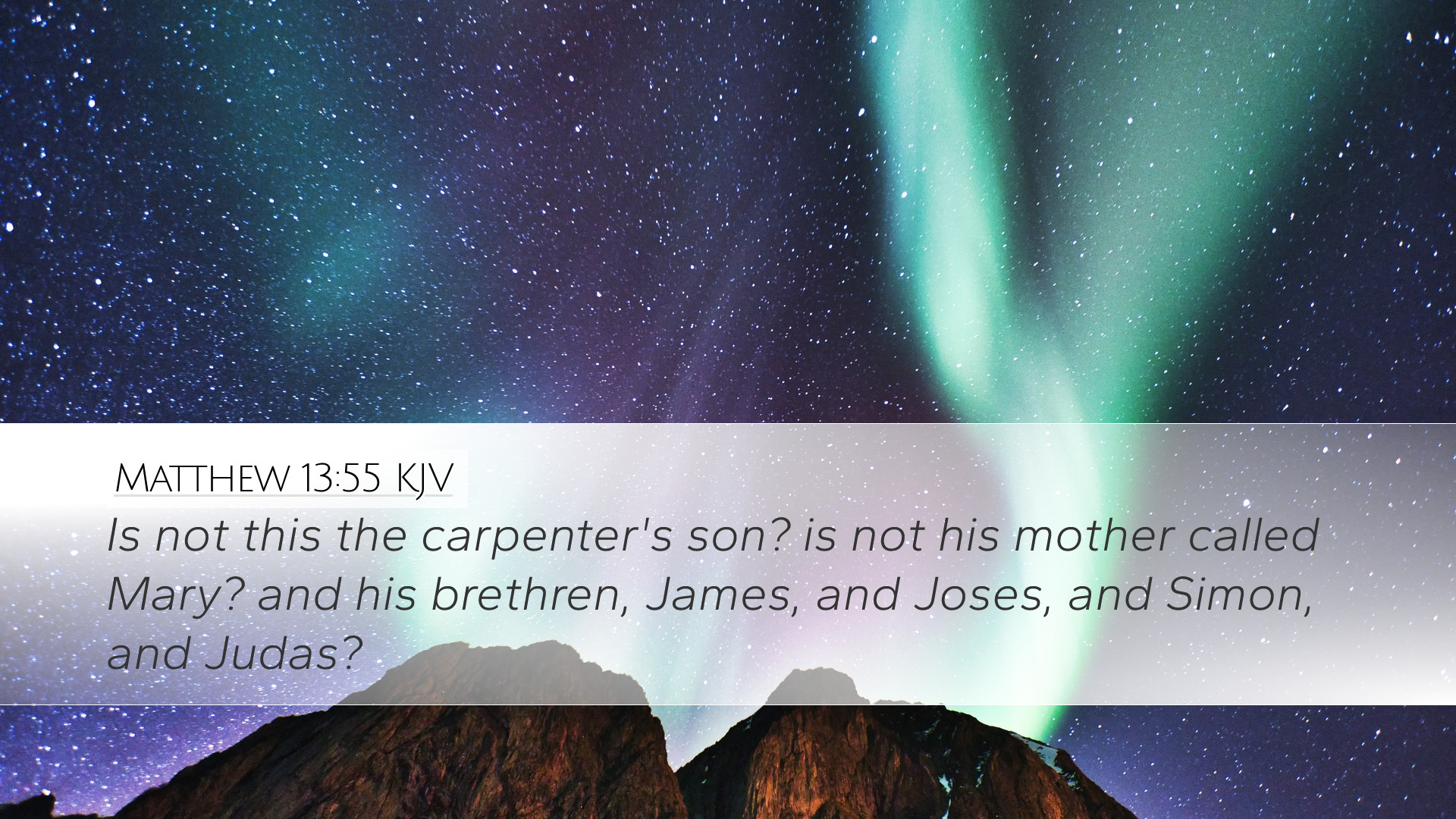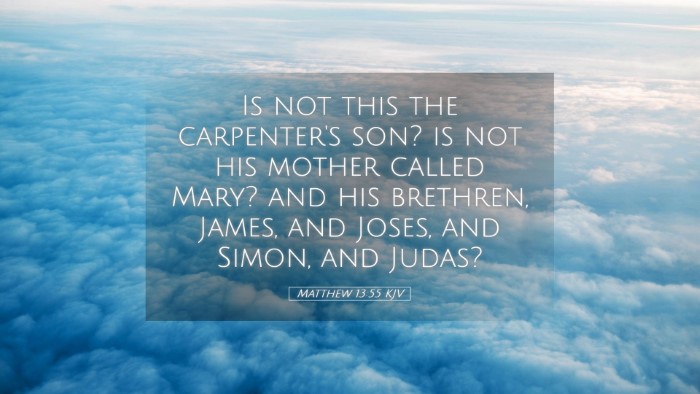Commentary on Matthew 13:55
Verse Text: "Is not this the carpenter's son? is not his mother called Mary? and his brethren, James, and Joses, and Simon, and Judas?"
Introduction
This passage from the book of Matthew presents a poignant reflection on the perception of Jesus within his own community. It raises important theological questions regarding identity, humility, and the divine nature of Jesus as the Messiah. This commentary synthesizes insights from notable public domain theologians including Matthew Henry, Albert Barnes, and Adam Clarke.
Contextual Background
Matthew 13:55 is nestled in a narrative context where Jesus is teaching in His hometown of Nazareth after performing various miracles and preaching the kingdom of God. The townspeople show skepticism and disbelief regarding His teachings and miraculous works. This skepticism is primarily rooted in their familiarity with Jesus' humble beginnings, which they struggle to reconcile with His divine authority.
Matthew Henry's Insights
Matthew Henry emphasizes the irony of familiarity breeding contempt. He notes:
- Familiarity with Jesus: The townspeople's knowledge of Jesus as the carpenter's son engenders a sense of disbelief. They struggle with the idea that someone they have known since childhood is indeed the Messiah.
- Humanity of Christ: Henry points out the emphasis on Christ's humble origins. By identifying Him as the carpenter's son, the community overlooks His divine identity. This reflects a broader principle in Christian teaching about the dual nature of Christ – fully God and fully man.
- Challenge of the Commonplace: The passage illustrates how common experiences and origins can hinder spiritual recognition and acceptance of greater truths.
Albert Barnes' Reflections
Albert Barnes provides a detailed exposition of the implications of this verse:
- Local Perception: He highlights how Jesus was held in contempt by those who were closest to Him, underscoring the age-old conflict between prophetic authority and local familiarity. The question posed reflects a disbelief and an inability to acknowledge the divine at work in someone so familiar.
- Family Dynamics: Barnes explores the mention of Jesus' mother, Mary, and His brothers. He notes that this serves to highlight the ordinary family life of Jesus, which contrasts sharply with His extraordinary mission. The “brethren” mentioned, including James and Judas, were likely known to the audience, further complicating their reception of Jesus as the Messiah.
- Cultural Context: Barnes remarks on the cultural implications of recognizing someone as ‘just’ a carpenter’s son. This reflects the broader societal tendency to underestimate individuals based on their background and upbringing.
Adam Clarke's Contributions
Adam Clarke adds a layer of historical and theological depth with his observations:
- Historical Jesus: Clarke offers insight into the life of Jesus as a carpenter. In the Jewish context, this trade represents diligence and humility, suggesting that Jesus was likely engaged in skilled labor alongside Joseph, which reflects His socio-economic status and relatability.
- The Reaction to Jesus' Ministry: He discusses the implications of the townspeople's response to Jesus. Clarke points out that their refusal to accept Jesus due to His origins was a failure to see the divine mission, a theme echoed throughout the Gospel narrative.
- Spiritual Blindness: Clarke emphasizes the theme of spiritual blindness which pervades the Gospels. Here, the people are unable to see the truth of who Jesus is due to their preconceived notions stemming from familiarity.
Theological Themes
The passage from Matthew 13:55 raises several key theological themes:
- The Nature of Jesus: The humble beginnings of Jesus invite deeper reflection on the nature of the divine. Jesus, despite being divine, chose to enter humanity in an ordinary way, teaching that true greatness often comes from humility.
- Recognition of Authority: The difficulty the townspeople had in recognizing Christ's authority is a commentary on human nature's tendency to doubt that which is familiar or commonplace, prompting a call for humble faith.
- Jesus’ Family: The mention of His siblings invites discussion on the family of Christ, often leading to inquiries about His brothers and their roles in early Christianity. These discussions help understand the communal nature of belief and the implications of Jesus' family dynamics on His ministry.
Conclusion
Matthew 13:55 stands as a profound reminder that familiarity can often cloud spiritual perception. The commentary from Henry, Barnes, and Clarke emphasizes not only the challenges Jesus faced in His ministry but also the broader implications for believers today. This verse calls for self-examination, urging readers to reflect on their perceptions of Christ amid societal and familial expectations. As pastors, students, theologians, and scholars engage with this text, they are reminded of the rich complexities of Jesus' identity and the enduring challenge of recognizing the divine in the mundane.


